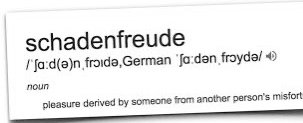by Joanie Butman
This is difficult and embarrassing to admit, but my first reaction to Kamila Valieva’s meltdown in the Olympics was schadenfreude*. I was astonished at my lack of empathy for this young girl and how innate my response was. Who doesn’t like to see a ‘cheater’ fail, though it was the adults surrounding her who were at fault. Even so, she suffered the consequences. The shame of it is that Valieva’s talents speak for themselves without needing an edge to set her apart from the pack. Her grace on the ice is something to behold.
Why are humans tempted to feel joy over someone else’s misfortune? I’m sure I wasn’t the only one who felt justice had been served. People love to read and comment about the mistakes of others. Schadenfreude is the business model of tabloids and social media. They thrive on it. Perhaps it’s because we’d like life to be fair where what goes around comes around. There’s a reason for the popularity of movies like The Equalizer, or any of the superhero sagas, where the good guys win in the end and the bully gets his/her comeuppance.
Sadly, schadenfreude is probably the least of my offenses towards God. They may not always be on public display, but Christ knows every one of them yet still offers His love, mercy and grace. Tim Keller sums up the Gospel like this, “We are more sinful and flawed in ourselves than we ever dared believe, yet at the very same time we are more loved and accepted in Jesus Christ than we ever dared hope.” That said, one of the hardest truths to accept for many is that Christ offers the same to all who choose to believe. Let’s face it, there are some people we like to judge as beyond redemption. And there are probably plenty who think I’m in that camp, which is why I’m eternally grateful life’s not fair. If it were, I’d be doomed. As I’ve always told my kids when they employed the that’s-not-fair card, “No, it’s not. If life was fair, you’d have a lot less.” That response usually shut them down because they didn’t want to hear the inevitable lecture to follow.
There is no one who experienced the inequity of life more than Jesus – and He did it for me. He suffered the consequences of my sin willingly. Acknowledging that reality allows me to extend the same undeserved love, mercy and grace to everyone I encounter, not just the ones I consider ‘deserving.’ In doing so, I honor Jesus and there is no greater reward.
Regrettably, my salvation doesn’t stop my base instincts from rearing their ugly head, but it does make me aware of them and changes how I choose to respond to them. As Paul admonishes in 2 Corinthians 10:5, “we take captive every thought to make it obedient to Christ.“ So while schadenfreude might have been my first instinct, I chose empathy instead. Maybe there's hope for me yet!
*Schadenfreude is the experience of pleasure, joy, or self-satisfaction that comes from learning of or witnessing the troubles, failures, or humiliation of another. (Wikipedia)





